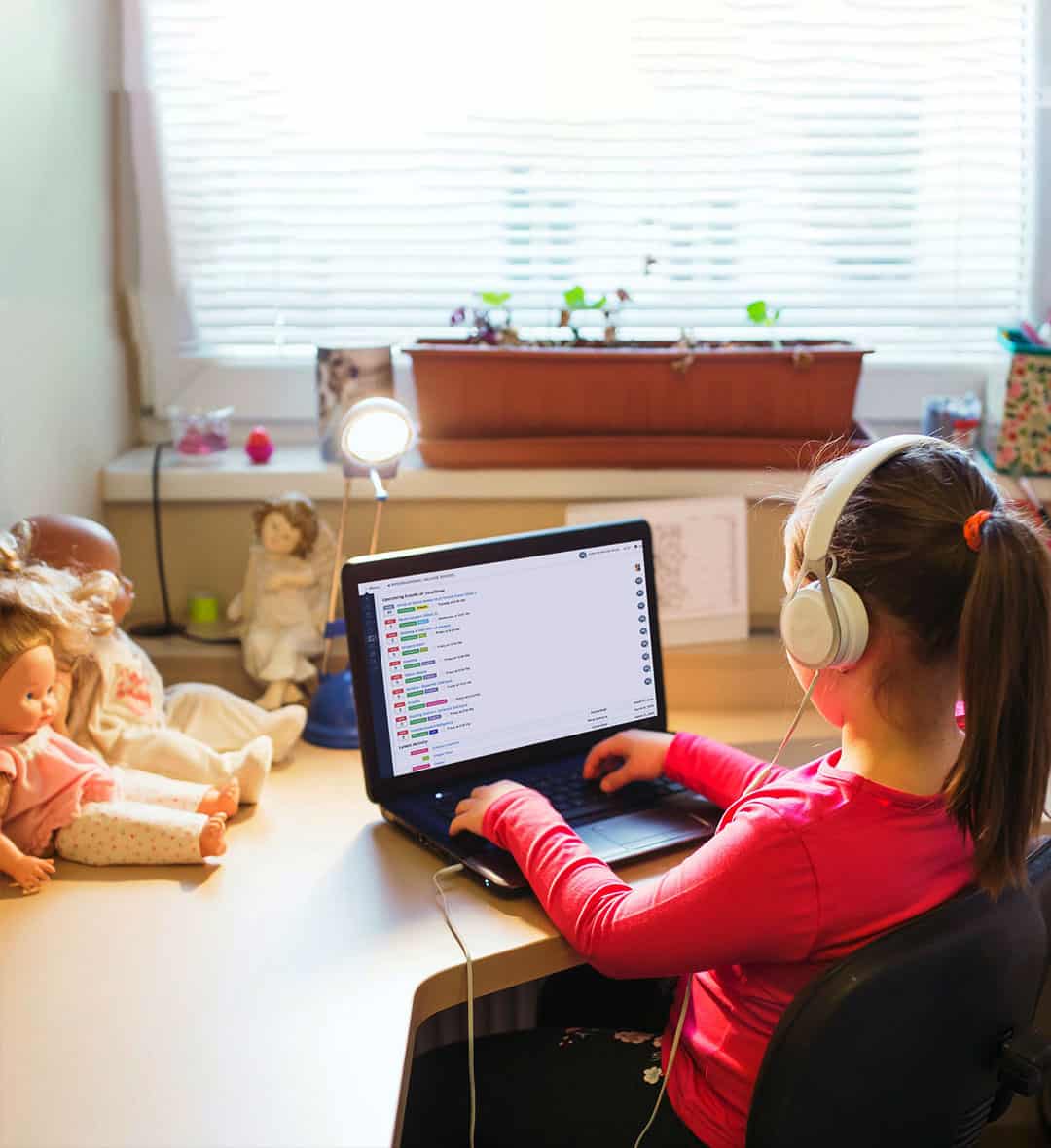
The International Village School has established its place as an outstanding IB World School by achieving accreditation in its first two years.
As a member of the IB World Schools, we implement the IB approach in our teaching and learning. An innovative, and unique method, the IB approach is focussed on the principles of student-centred, holistic, inquiry-based learning. It is an approach that stimulates curiosity and develops an understanding of concepts. It is equally important for students to develop the skills to apply the knowledge as well as understand the concepts.
International Village School is one of the few IB schools in Chennai that has introduced the Primary Years Program and is developing into an IB Continuum School (MYP & DP).
A student-centered, holistic and inquiry based learning approach challenges our students to construct a deeper understanding and application of concepts. Skills and strategies are learned through constructive instructions and applied in engaging project work, investigations and authentic activities with a blend of child guided and teacher guided learning.
To assist in the delivery of this approach, we are using the International Baccalaureate framework of inquiry based learning for the Primary Years Program (IB PYP - ages 3 to 12) leading to the Middle Years Program (IB MYP - ages 12 to 16) and resulting in the IB Diploma Program (IB DP - ages 16-19). We are pleased to announce that within our first two years of operations we have achieved International Baccalaureate World school status for the Primary years Program.
We believe that to prepare children for life and to develop a mindset for the challenges of the future, students need a holistic learning experience. Our five learning areas provide a well- rounded educational program that empowers our students to follow the path towards their passions, aspirations, purpose, and personal success.
The Five Holistic Elements lead students to a deeper level of inquiry and understanding, confidence in their skills and abilities. Students grow personally, develop social skills, and acquire a sense of well-being.
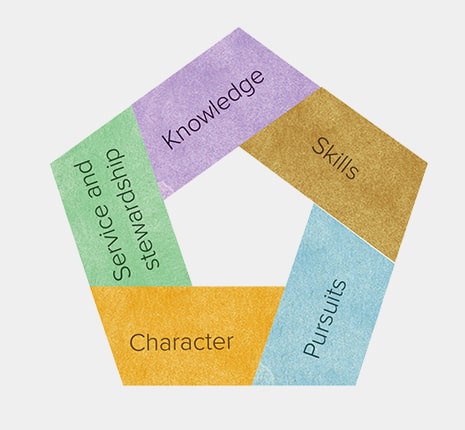
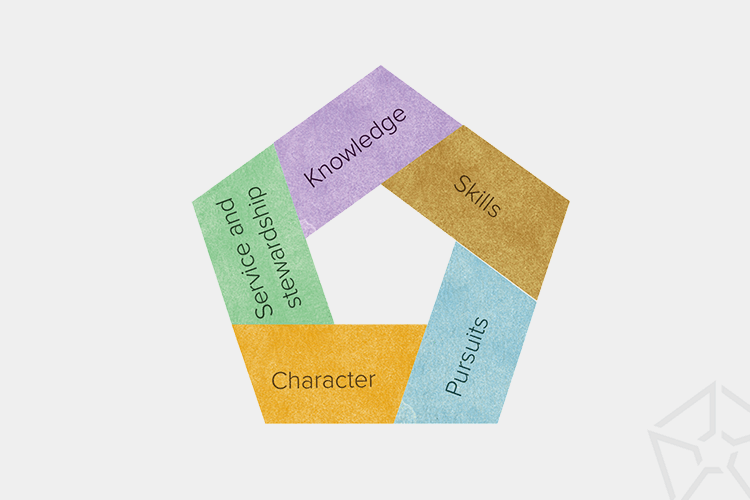
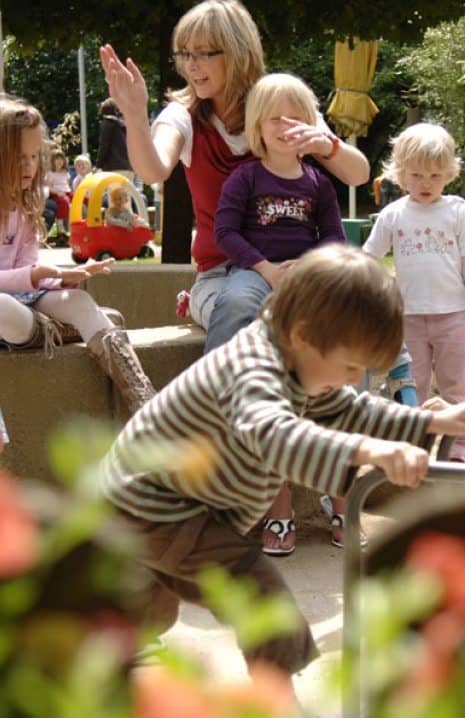
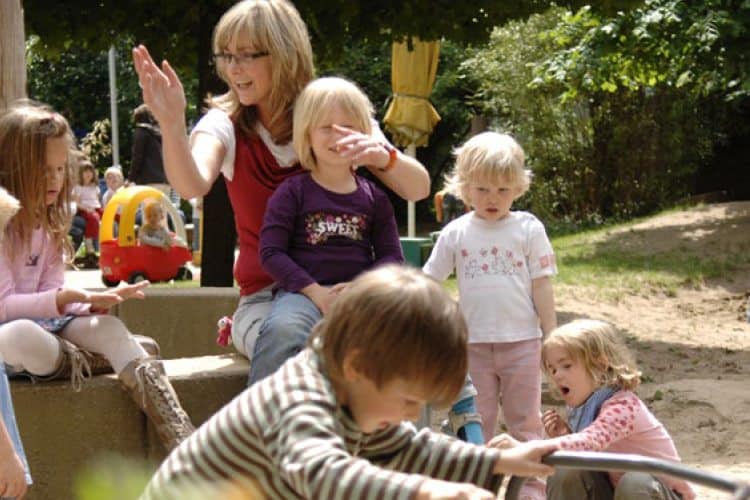
In early childhood we are inspired by the Reggio Emilia approach. It offers a nurturing environment that is learner centered, with an emphasis on exploration and inquiry through play based learning leading up to the IB-PYP program from age 3 upward. A foundation for emotional, social, physical and intellectual learning is set through developmentally responsive approaches and a stimulating environment.
Classrooms connect to a large central atelier, where students can interact and explore a variety of materials to stimulate creativity and wonderment. The atelier is designed to engage students in various learning experiences through storytelling, art, imagination and discovery.
Outdoor experiences are an integral part of student learning, where the design of classrooms extends to the outdoor learning environment. Students engage in sensorial experiences and build their understanding on the different foundational concepts as they play in the sandpit and water play areas using various metric aids and references. Children explore music through the different outdoor installations that are set naturally on our campus.
I.B Primary Years Programme
To support achieving our Vision and Mission, IVS has achieved IB World School Status to deliver PYP. The PYP prepares students to become active, caring, lifelong learners who demonstrate respect for themselves and others and have the capacity to participate in the world around them. It focuses on the development of the whole child.
IVS is an IB world school offering the IB Primary Years Program. Our constructive approach has a balance of inquiry and guided instruction. Students deepen their understanding of concepts, develop communication skills and engage in higher level thinking by collaborating, investigative thinking, and problem solving through the STEAM (Science, Technology, Engineering, Arts, Math) and inquiry-based learning approach. Our Makerspace area promotes creativity to envision, plan, test and iterate upon ideas.
Students will have scheduled lessons with the home room teacher for language arts, science, maths and social studies. World languages, health and physical education, visual and performing arts would be taught by specialist teachers, including but not limited to French, Tamil, Hindi, Music, Art, Craft, Swimming, PE, Drama and Dance.
Outdoor experiences are an integral part of student learning, where the design of classrooms extends to the outdoor learning environment. Students engage in sensorial experiences and build their understanding on the different foundational concepts as they play.

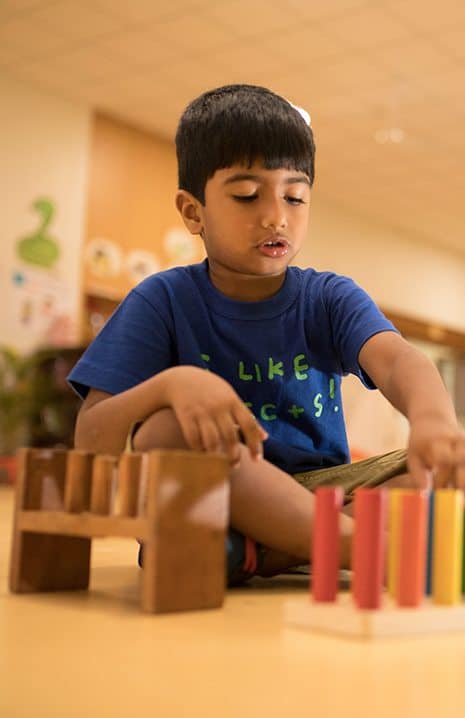

The IB Middle Years Programme MYP is designed for students aged 11 to 16. It provides a framework of learning that encourages students to become creative, critical and reflective thinkers. The MYP emphasizes intellectual challenge, encouraging students to make connections between their studies in traditional subjects and the real world. It fosters the development of skills for communication, intercultural understanding and global engagement—essential qualities for young people who are becoming global leaders.
The MYP is flexible enough to accommodate most national or local curriculum requirements. It builds upon the knowledge, skills and attitudes developed in the IB Primary Years Programme (PYP) and prepares students to meet the academic challenges of the IB Diploma Programme (DP)

The MYP Curriculum
The MYP consists of eight subject groups:
language acquisition, language and literature, individuals and societies, sciences, mathematics, arts, physical and health education, and design.
Student study is supported by a minimum of 50 hours of instruction per subject group in each academic year. In years 4 and 5, students have the option to take courses from six of the eight subject groups, which provides greater flexibility.
The MYP: a unique approach, relevant for a global society.
The MYP aims to help students develop their personal understanding, their emerging sense of self and responsibility in their community.
MYP teachers organize the curriculum with appropriate attention to:
• Teaching and learning in context. Students learn best when their learning experiences have context and are connected to their lives and the world that they have experienced. Using global contexts, MYP students explore human identity, global challenges and what it means to be internationally minded.
• Conceptual understanding. Concepts are big ideas that have relevance within specific disciplines and across subject areas.
MYP students use concepts as a vehicle to inquire into issues and ideas of personal, local and global significance and examine knowledge holistically.
The IB Diploma Programme is an academically challenging and balanced programme of education, with final examinations, that prepares students aged 16 to 19 for success at university and in life beyond. It has been designed to address the intellectual, social, emotional and physical well-being of students. The programme has gained recognition and respect from the world’s leading universities.
The IBDP Curriculum
DP students must choose one course from each of five subject groups delivering a breadth of knowledge and understanding in language and literature, individuals and societies, the sciences and mathematics.
Furthermore, students must also choose either an arts course from the arts group or a second course from one of the other subject groups. DP courses can be taken at higher level (HL) or standard level (SL). At least three, and not more than four, are taken at HL (240 teaching hours), while the remaining courses are taken at SL (150 teaching hours). SL courses ensure students are exposed to a range of disciplines that they might otherwise opt out of, and HL courses allow students to spend more time with subjects they are more
interested in, by exploring options in addition to the SL core curriculum. In this sense, all DP courses, regardless of whether they are SL or HL, are integral to the programme. Students can study and take examinations in English, French or Spanish. Two courses are classified as interdisciplinary, meaning that they satisfy the requirements of more than one subject group.
• Literature and performance (studies in language and literature subject group and the arts subject group)
• Environmental systems and societies (individuals and societies subject group and sciences subject group)
In addition to disciplinary and interdisciplinary study, the DP features three core elements that broaden students’ educational experience and challenge them to apply their knowledge and skills.

The Diploma Programme core:
The extended essay (EE) requires students to engage in independent research through an in-depth study of a question relating to one of the DP subjects they are studying. The world studies EE option allows students to focus on a topic of global significance, which they examine through the lens of at least two DP subjects.
Theory of knowledge (TOK) develops a coherent approach to learning that unifies the academic disciplines. In this course on critical thinking, students inquire into the nature of knowing and deepen their understanding of knowledge as a human construction.
Creativity, activity, service (CAS) emphasizes helping students to develop their own identities in accordance with the ethical principles embodied in the IB mission statement and the IB learner profile. CAS complements a challenging academic programme in a holistic way, providing opportunities for self-determination, collaboration, accomplishment and enjoyment. It involves students in a range of activities alongside their academic studies
throughout the DP. The three strands of CAS are creativity (exploring and extending ideas leading to an original or interpretive product or performance), activity (physical exertion contributing to a healthy lifestyle) and service (collaborative and reciprocal engagement with the community in response to an authentic need).
Assessment
Students take written examinations at the end of the programme, which are marked by external IB examiners. Students also complete assessment tasks in the school, which are either initially marked by teachers and then moderated by external moderators or sent directly to external examiners. The grades awarded for each course range from 1 (lowest) to 7 (highest). Students can also be awarded up to three additional points for their combined results on TOK and the EE. The diploma is awarded to students who gain at least 24 points, subject to certain minimum levels of performance across the whole programme and to satisfactory participation in the CAS requirement. The highest total that a DP student can be awarded is 45 points. Assessment is criterion-related, which means student performance is measured against specified assessment criteria based on the aims and objectives of each subject’s curriculum, rather than the performance of other students taking the same examinations.
Research
Whether conducted in collaboration with the IB or independently, research generally suggests that an IB education has a positive impact on schools, students and teachers. Research plays a central role in the development, quality assurance and assessment of impact of the IB programmes and services. The IB conducts research in two key areas: programme impact research, which investigates the implementation and impact of IB programmes, and programme development research, which supports the development review of all programme curriculum and pedagogy. Research conducted both by the IB and external bodies show the DP curriculum and assessment compares favourably to other qualifications. To review latest research on the DP visit www.ibo.org/research
All activities offered by our staff are free of charge. There may be a cost associated with some activities, where the instructor is from outside of our school community, the participant’s parents pay this fee.
Clubs including but not exclusive too; gardening, dance, football, archery, horse riding, climbing, Tamil, Hindi, etc. based on interest and appropriate adult leaders.
Visual and performing arts including drama, arts and crafts, music exploration, choir, etc.
Student leadership will provide a variety of opportunities that are age appropriate to encourage and foster students to develop their leadership skills.
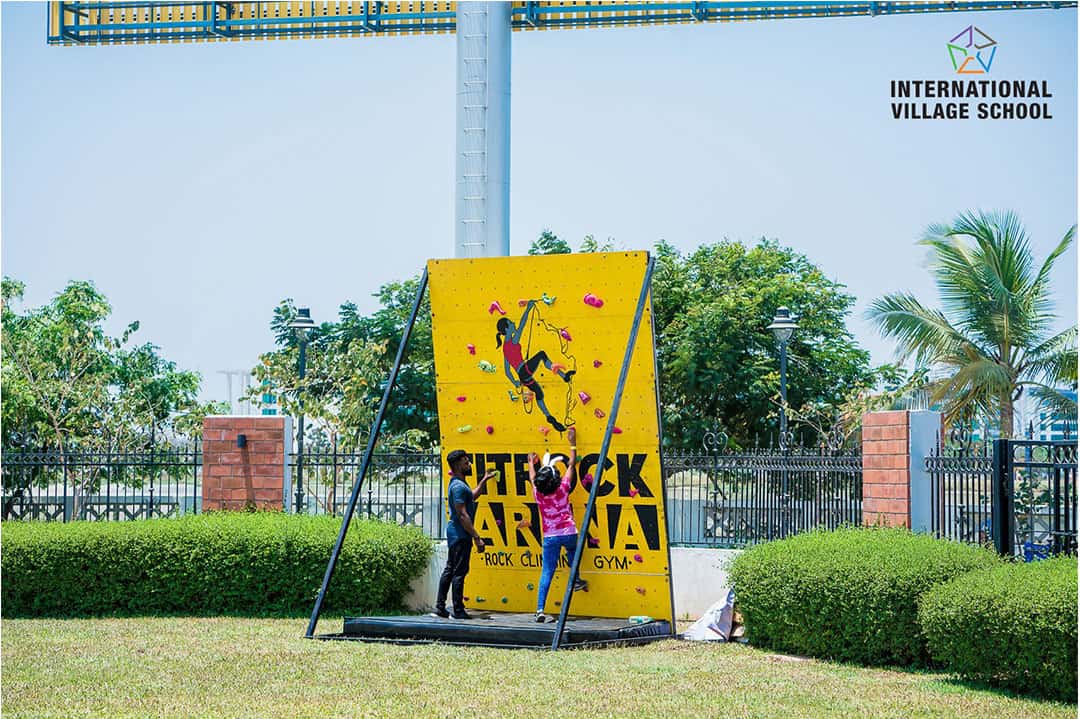
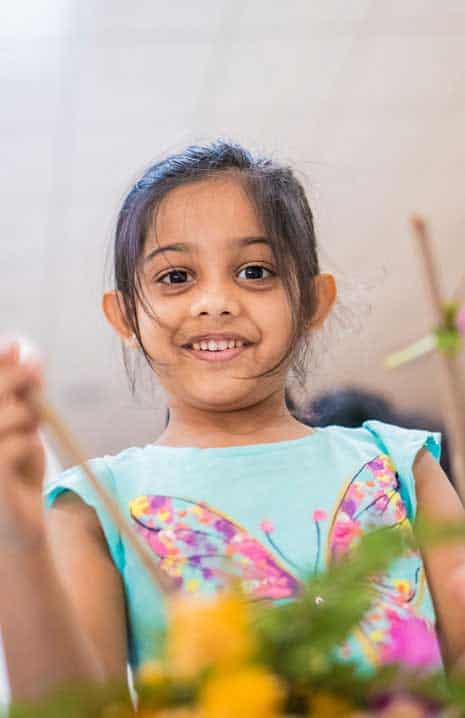
Through active participation in initiatives and projects, students will practice and develop good judgement, refine their values, and reflect on their role and impact on the environment. Students will grow in their confidence as they are empowered to act as advocates for the environment within our community.
We will engage in both local and global projects that will occur at all grade levels, building in complexity, student initiative, and leadership. Our projects will range from managing our on-campus recycling, to planting trees, to larger scaled initiatives. Our students will have authentic, hands-on experience in conservation efforts and with the challenges of pollution and environmental degradation.
Students have access to explore our Environmental Awareness Centre. Here the aquaponic facility relies on a symbiotic relationship between fish and plants. The plants are enriched with the nutrient rich water from the fish tank, and the plant beds filter the waste, and return clean water to the fish. It is a highly efficient system for the optimal utilization of water. The Centre is a great platform to explore, research and facilitate the integration of STEAM into our curriculum. All children will have the opportunity to plant seeds to grow trees to further increase the biodiversity in our neighbourhood.
We further demonstrate our commitment to the environment by: